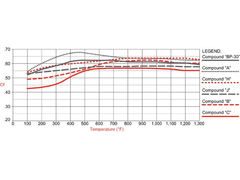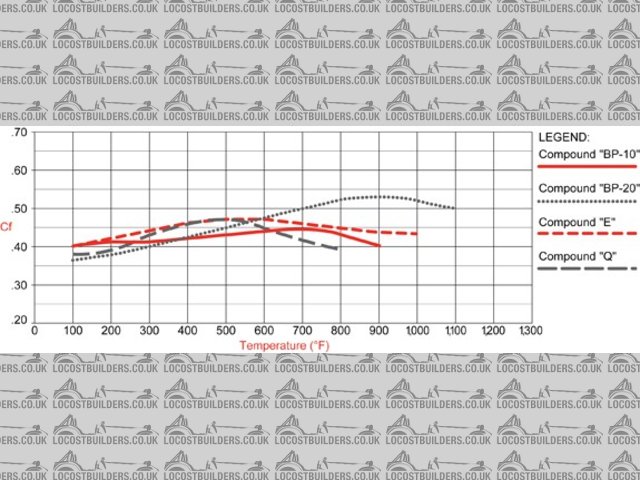Ivan
|
| posted on 16/5/16 at 11:57 AM |

|
|
Brake pad quandry - what is the down side of racing pads on the street
I have updated my Jag based Cobra with Wilwood Disks and calipers at the front - they came off a racing Mustang when class rules changed allowing
upgraded brakes and are brand new. They came with "Polymatrix A" racing pads and despite Wilwood saying they are Race only seem to work
very well on the street. The down side is the rear is now very under braked.
To fix this I am intending to scrap the Jag Booster & MC and switch to twin MCs with balance bar. A check on Mike Polan's Brake calculator
shows that pedal pressure will be a problem (Around 135 lbs) unless I switch to high friction Coeff pads at the rear as well which will bring the
pressure down to around 120 lbs at 0.8G.
 
Description
Putting Polymatrix A pads on the rear will go a long way towards balancing the system but I am not sure about what the down sides of using them on the
street are. They seem to have very superior cold stopping - maybe even better that street pads - but might squeal (So far not!) Normal pads have a CF
of 0.3-0.4 the Poly A pads 0.55 to 0.675.
|
|
|
|
|
FuryRebuild
|
| posted on 16/5/16 at 12:22 PM |

|
|
I'm in the process of doing similar with my fury - Poly-A (carbon metallic) onto Willwoods. The warnings are apparently they can chew through
cross-drilled disks, but the chaps at Siltech have been racing these for ages and don't think they've observed that - more a case of
strong warnings to be sure they have liability in the right place. Rally-Design (who sold me the calipers) were suggesting that I go to solid disks.
At £40 each (for my car) I'm willing to see if I wreck a set.
The only other warning I've heard, but I've not been able to verify is that they can generate more dust.
Go for it.
When all you have is a hammer, everything around you is a nail.
www.furyrebuild.co.uk
|
|
|
v8kid
|
| posted on 16/5/16 at 12:49 PM |

|
|
I was always under the impression that racing pads were very temperature sensitive and that from a cold start would have a lower coefficient of
friction than street pads. However the situation was reversed at higher temperatures.
It was this inconsistency that I assumed was regarded as undesirable for " granny doing the shopping" scenario that all manufacturers have
to consider.
Is this no longer the case?
Cheers!
You'd be surprised how quickly the sales people at B&Q try and assist you after ignoring you for the past 15 minutes when you try and start a
chainsaw
|
|
|
nick205
|
| posted on 16/5/16 at 02:51 PM |

|
|
quote:
Originally posted by v8kid
I was always under the impression that racing pads were very temperature sensitive and that from a cold start would have a lower coefficient of
friction than street pads. However the situation was reversed at higher temperatures.
It was this inconsistency that I assumed was regarded as undesirable for " granny doing the shopping" scenario that all manufacturers have
to consider.
Is this no longer the case?
Cheers!
My understanding was also the low temperature performance was not as good on road.
|
|
|
Sam_68
|
| posted on 16/5/16 at 03:11 PM |

|
|
quote:
Originally posted by v8kid
I was always under the impression that racing pads were very temperature sensitive and that from a cold start would have a lower coefficient of
friction than street pads. However the situation was reversed at higher temperatures.
This has certainly been my experience of race pads in the past - first time you used the brakes from a cold start there would be absolutely
nothing there. Wet motorways used to be a bit of a liability, too, 'cos if you weren't using the brakes frequently enough to keep
them warm and clear of water, they simply wouldn't work if you needed them in an emergency. You soon get in the habit of dabbing the brakes
every now and then to compensate, though.
They also used to have a habit of glazing and squealing like a 16 year old girl unless you gave them a decent workout every so often.
|
|
|
Ivan
|
| posted on 16/5/16 at 03:19 PM |

|
|
I expected that the pads would have very little cold bite but in fact their behavior when cold bares out the CF charts and seems more than adequate.
Wet behavior - I don't normally drive the Cobra in the rain so can't comment on that.
In fact they have nearly double the CF of street pads per this chart:
 
Wilwood Street Pads
Which leaves the question - are the Poly A the perfect street pads - if not why not?
|
|
|
phelpsa
|
| posted on 16/5/16 at 04:58 PM |

|
|
Carbon metallic pads traditionally have a habit of filling aluminium wheels with iron filings. They work better with 420 stainless discs but
it's very difficult to make vented discs from it.
|
|
|
Oddified
|
| posted on 16/5/16 at 08:56 PM |

|
|
Many of the newer pad materials don't suffer from the big friction variation between cold and hot operation, unlike older 'race'
pads. I use the ferodo ds1.11 pads in my wilwoods, wet/dry, cold/hot they're very good.
Ian
|
|
|
jeffw
|
| posted on 17/5/16 at 07:48 AM |

|
|
I wouldn't fit any of the Wilwood pads, they all seem to feel very wooden in use and overheat quite quickly.
Hawk or Performance Friction makes some excellent pads.
|
|
|
onenastyviper
|
| posted on 17/5/16 at 08:25 AM |

|
|
Is it true that components for a car on the road need to be 'E' marked to show conformance with the appropriate standards?
If a pad was either not marked as such or specifically marked for off-road use and then the car was involved in an accident then the police or
insurance would have a route for prosecution or voiding?
"If I knew what I was doing then it wouldn't be called research would it?...duh!"
|
|
|
phelpsa
|
| posted on 17/5/16 at 08:31 AM |

|
|
quote:
Originally posted by onenastyviper
Is it true that components for a car on the road need to be 'E' marked to show conformance with the appropriate standards?
If a pad was either not marked as such or specifically marked for off-road use and then the car was involved in an accident then the police or
insurance would have a route for prosecution or voiding?
Not for brake pads. The manufacturer is just covering themselves liability wise should an investigation deem the brake pads to be the cause of an
accident on the road. If it could be proved that you fitted them knowing of the limitations and they caused an accident then I guess you would be held
accountable.
[Edited on 17-5-16 by phelpsa]
|
|
|













